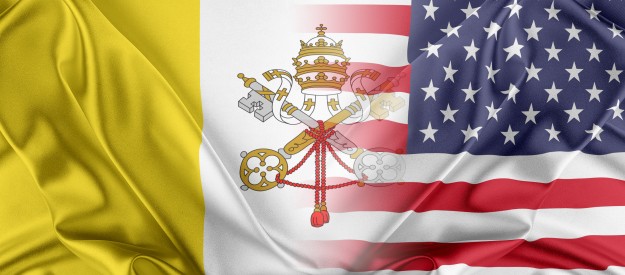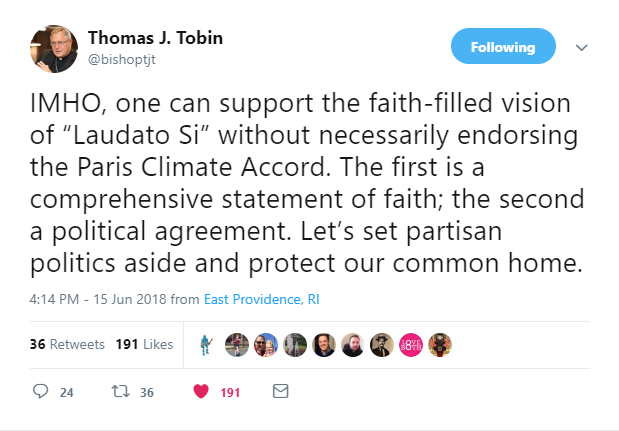"We are losing our attitude of wonder, of contemplation, of listening to creation and thus we no longer manage to interpret within it what Benedict XVI calls 'the rhythm of the love-story between God and man.'"
+ Pope Francis
On the three-year anniversary of Laudato Si’: U.S. bishops, Catholic leaders affirm “We are still in” Paris Accord

Following a weekend of Catholic rebukes of the Trump administration over the handling of children at immigration detention centers, Catholic leaders this morning announced their support for another initiative at odds with the president: the signing of the Catholic Climate Declaration by some 600 US-based Catholic institutions.
The overwhelming support of the declaration is notable with the document's affirmation of the goals of the Paris Climate Agreement. The Catholic Climate Declaration echoes the U.S. bishops’ disappointment with the Trump Administration’s announced withdrawal and it reiterates the Church’s well-established moral and non-partisan call for climate action in caring for our common home and our one human family—especially among poor and vulnerable communities.
It was three years ago today that Pope Francis released his encyclical Laudato Si’, in part to influence the Paris Agreement negotiations. At the time, President Obama’s administration was orienting the United States to be a leader in climate action. Much of that momentum was lost in 2016 with the election of Donald Trump and organizers of the Catholic Climate Declaration are hoping today's news will fire up the faithful.
The declaration—signed by cardinals and other bishops, college and university presidents, healthcare executives, leaders of religious communities and many others on behalf of their institutions—affirms that the U.S. Catholic community’s support of the “We Are Still In” movement in support of the Paris Agreement and the actions required to protect our common home.
Dan Misleh, Executive Director of the Catholic Climate Covenant, which coordinated the signing of the declaration, said in a morning presser that the declaration was an “unprecedented step” into the void left by the Trump administration.
The declaration states in part that “[c]limate change is an urgent moral issue because it compromises the future of our common home, threatens human life and human dignity, and adds to the hardships already experienced by the poorest and most vulnerable people both at home and abroad. We teach that governments exist to protect and promote the common good.”
Calling the administration’s rejection of the treaty “shameful,” Misleh added that with the signing of the declaration—and in other ways—Catholic leadership was encouraging dialogue and building bridges, as well as taking concrete steps to more prudently use energy efficiently, as well as to use renewable sources whenever possible.
Such strategies help create jobs and save money for Catholic institutions, which can bolster those institution’s core mission activities, Misleh said.
His Excellency Bishop Richard Pates of the Diocese of Des Moines spoke for the United States Conference of Catholic Bishops in affirming the bishop’s desire for the United States to re-enter the Paris Accord. He also stressed the importance of individual dioceses, parishes, and individuals to take action.
This second statement is notable for those bishops who prioritize personal and ecclesial actions over political ones.
While my own bishop, Thomas J. Tobin of the Diocese of Providence, is one of the bishops that did not sign the declaration—and on Friday evening Tweeted his views of the matter—he has clearly stated his eagerness to shepherd his local church toward a better engagement with Laudato Si’ and with the entirety of the Church’s eco-teachings.

In 2015, Bishop Tobin hosted scientists and theologians in a diocesan forum to discuss Laudato Si’ in light of global and local climate science. The Diocese of Providence has not only supported the national efforts of the Catholic Climate Covenant, it has also held special deanery-based workshops to introduce pastors and parish staff with local energy efficiency groups and the state’s energy provider.
Bishop Pates, the USCCB liaison with the Catholic Climate Covenant, noted the necessity of such local action and, at the same time, expressed his strong episcopal support in urging the United States to remain in the Paris Accord.
In his comments regarding the declaration, Bishop Pates noted “the immorality of inaction on climate change has been clear for a long time. With ever-increasing temperatures fueling super hurricanes as well as extending and deepening droughts, we are seeing the tragedies of inaction up close and personal.” Bishop Pates recalled the people on the Gulf Coast of Texas and in Puerto Rico who continue to recover from last year’s devastating hurricanes."
Also speaking this morning were Sister Sharlet Wagner, CSC, President-elect of Leadership Conference of Women Religious; Father Daniel Hendrickson, SJ, PhD., President of Creighton University; and Rachelle Reyes Wenger, Director of Public Policy and Community Advocacy, Dignity Health.
The three voices rounded out the on-the-ground efforts being made by religious communities and educational institutions, as well as one that may at first sound surprising: the Catholic healthcare field. There is, after all, a growing awareness of the impacts to human health by warmer temperatures and advancing vectors that spread disease.
Each speaker represented the wide world of Catholic eco-activity—which in some cases has been occurring for decades.
Both Misleh and Sister Wagner stressed the long-standing efforts of women religious in caring for creation. Sister Wager credited this charism in part to the communal living of religious communities, which makes community engagement a natural. She also noted the long history of women religious for actively living the gospel in the communities out of which their orders arise of and into which they enter.
Indeed, the comments by the Catholic Climate Covenant’s Misleh and Sister Wagner cannot be amplified enough. The Church owes a great debt to many such religious orders, especially the generations of women who have tirelessly fought for human dignity as well as for the great garden entrusted to us by God.
Rounding out the large-scale institutional efforts of academia and hospitals, Fr. Hendrickson and Ms. Reyes Wagner both noted the excellent work in assessing, teaching, and responding to real-world climate impacts.
Misleh cited several examples of actions taken by signatories to the declaration. The Archdiocese of Chicago is benchmarking the energy and water use of all their buildings and the Archdiocese of Atlanta rolled out a 40-page, Laudato Si’ action plan. He also noted that the Covenant’s Catholic Energies program, which assists Catholic facility owners in reducing their carbon footprint, is nearing $10 million in energy efficiency and renewable energy projects throughout the country.
Recognizing that more needs to be done (whether or not the Trump administration rejoins the Paris Accord) everyone on this morning’s call promised more ahead.
And so as the richness of Laudato Si’ continues to inform the life of the Church here in the States, it will be critical for dioceses and parishes, institutions and individuals, to partner with groups like the Catholic Climate Covenant and all the resources they’ve made available.
To begin, you can have your Catholic group or organization sign the declaration.
Then you can take action on energy and other eco matters. See this post and this one on steps that Catholics can take, as well as this parish guide, assembled by the Global Catholic Climate Movement. There are also these creation-care resources at the Covenant's website.)
But first, as always, we must pray.
It is not enough merely to demand action through advocacy. Rather, we must seek first the grace and the virtues necessary to care for the good and ordered creation that God has asked us to care for, as well as for the people who inhabit it, whom God has asked us to love.


















